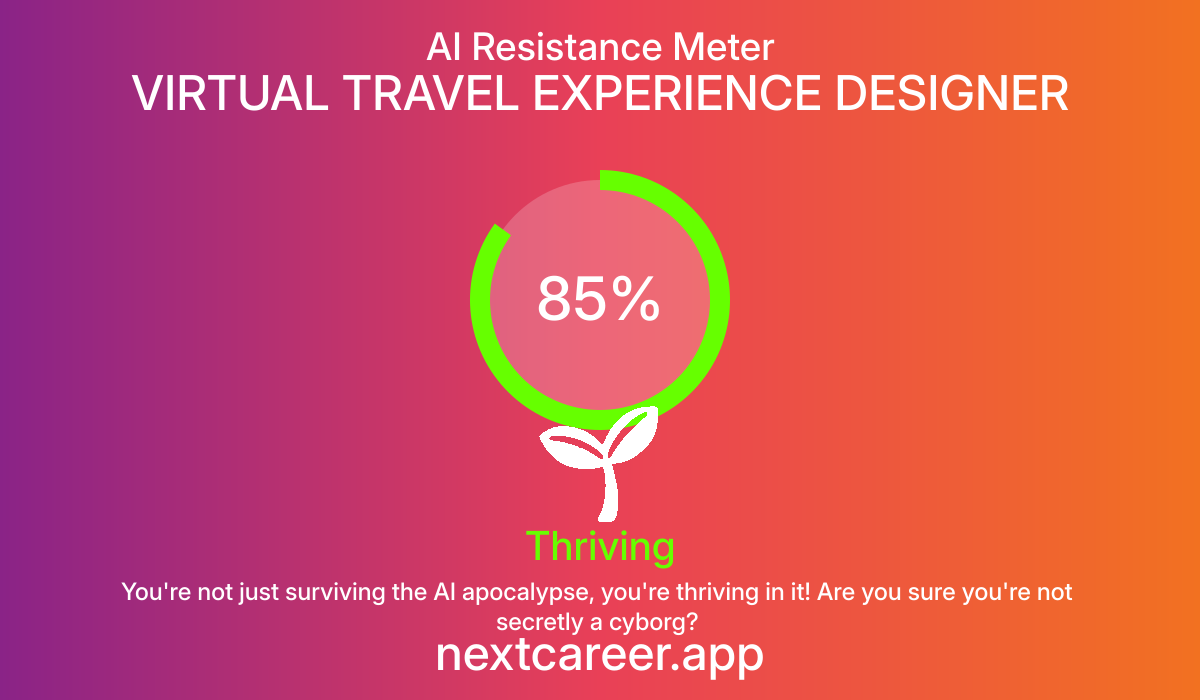AI Resistance Analysis
VIRTUAL TRAVEL EXPERIENCE DESIGNER
VIRTUAL TRAVEL EXPERIENCE DESIGNER
AI Resistance Score
AI Resistance Meter
Thriving
VIRTUAL TRAVEL EXPERIENCE DESIGNER
You're not just surviving the AI apocalypse, you're thriving in it! Are you sure you're not secretly a cyborg?
The role of a Virtual Travel Experience Designer is highly creative and requires a nuanced understanding of user experience, creativity, and emotional storytelling, making it relatively resistant to AI replacement. While AI can assist in certain aspects, such as data analysis and initial content generation, the core of this job relies on human intuition, empathy, and the ability to craft unique travel narratives that resonate on a personal level with users.
The role of a Virtual Travel Experience Designer is highly creative and requires a nuanced understanding of user experience, creativity, and emotional storytelling, making it relatively resistant to AI replacement. While AI can assist in certain aspects, such as data analysis and initial content generation, the core of this job relies on human intuition, empathy, and the ability to craft unique travel narratives that resonate on a personal level with users.
Key Factors
- Cognitive Tasks: While AI can manage complex data and suggest designs or itineraries, the nuanced cognitive tasks of understanding individual preferences and crafting personalized experiences remain less automated.
- Emotional Intelligence: This role heavily relies on understanding emotions and creating experiences that provoke feelings. AI lacks the deep emotional intelligence required to connect meaningfully with diverse human experiences.
- Physical Skills: The job does not require significant physical skills, focusing more on virtual and experiential design, which can be supported by AI.
- Creative Thinking: High levels of creativity are essential in this role. While AI can generate content, the originality and depth of human creativity in designing travel experiences cannot be fully replicated.
Human Advantages
- Humans excel in understanding complex emotional narratives and individual customer preferences, which are critical in travel experiences.
- Creativity and originality in crafting experiences that resonate with human emotions and cultural nuances are uniquely human traits.
AI Vulnerabilities
- AI can assist in content generation and data analytics, leading to potential over-reliance on technology and less emphasis on unique, personalized experiences.
Recommended Actions
- Invest in developing strong storytelling and creative skills to enhance emotional engagement in experiences.
- Stay updated with AI tools and technologies relevant to design to leverage their capabilities without compromising the personal touch.
- Focus on niche experiences that require deep cultural knowledge and emotional connection, which are less likely to be automated.
In the near term (5 years), AI tools will augment the Virtual Travel Experience Designer's capabilities by providing data-driven insights, helping streamline processes, and generating content based on trends. However, the essence of the role will remain human-centric, focusing on empathy and personalized storytelling. In the long term (20+ years), we may see a hybrid model where designers work alongside AI to enhance experiences, but the demand for emotionally resonant, culturally rich travel narratives will preserve the need for human designers, even as the scope of their work evolves with technological advancements.

Why Calculate AI Resistance?
Understanding how AI-resistant your career is becoming increasingly important in today's rapidly evolving job market. Our analysis combines multiple factors including required human skills, technological adaptability, and future industry projections to give you a comprehensive view of your career's sustainability.